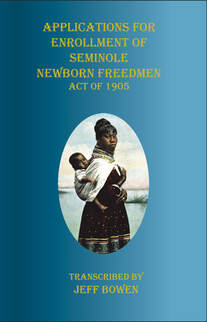Applications for Enrollment of Seminole Newborn Freedmen
Act of 1905
Jeff Bowen


Purchase From:
Amazon US
Barnes & Noble US
Books A Million US
Vroman's Bookstore US
Blackwell's UK
Fishpond AU
Indigo CA
For Libraries and Retailers Click below
ipage.ingramcontent
This volume supplements Mr. Bowen’s August 2012 two-volume set, Applications for Enrollment of Seminole Newborn, Act of 1905, Volumes I & II. Seminole Freedmen, as they were called, were the only African Americans living among the Five Civilized Tribes who were entitled to tribal allotments. Unlike the other Five Civilized Tribes--which held African Americans as slaves--the Seminole incorporated blacks into their tribe. Since the Curtis Act required the Dawes Commission to “follow tribal customs and usages” in processing applications for allotment, it had to consider any children of a mixed marriage “freedmen rather than citizens by blood . . .”; however, this did not prevent the newborn freedmen from sharing equally with full-bloods in the division of Seminole lands. Under this definition each Seminole newborn freedman was to receive forty acres of Indian Territory.
Mr. Bowen has transcribed the Applications for Enrollment of Seminole Newborn Freedmen, Act of 1905, from National Archive film M-1301, Roll 402. The applications found in M-1301 and transcribed in this series contain more information and establish family relationships not found on the census cards in National Archive film M-1186, the basis for the seminal title Final Rolls of Citizens and Freedmen of the Five Civilized Tribes in Indian Territory [and] Index to the Final Rolls. Mr. Bowen’s transcriptions include all correspondence associated with successful Seminole claimants. Besides the names of all parents and newborns, the applications include the names of doctors, lawyers, midwives, and other Seminole relatives whose identities were divulged as part of the application process, and who attended to the Seminole before and during this time in history.
ISBN: 978-1-64968-038-9
350 pages, paper
